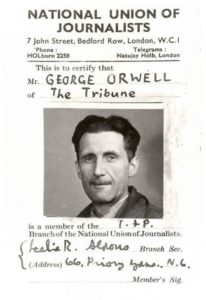Do we live in a fair society? What might a fair society look like, and what challenges do we face in trying to create one?
George Orwell wrote with integrity, truthfulness and fairness about the world around him. Now it’s your turn.
You can write in any form you like: journalism, essays, short stories, blog posts, poems, and plays are all welcome. How you respond to this year’s theme is completely up to you. However, we’ve pulled together a few resources that might help get you started or spark an idea.
WHY ORWELL?
‘The average millionaire is only the average dishwasher dressed in a new suit.’
George Orwell (Down and Out in Paris and London)
‘Is not England notoriously two nations, the rich and the poor?’
George Orwell (England Your England)
‘Poverty is poverty, whether the tool you work with is a pick-axe or a fountain pen.’
George Orwell (The Road to Wigan Pier)
‘All animals are equal, but some animals are more equal than others.’
George Orwell (Animal Farm)
As the Orwell Youth Prize, we find the man himself is often a good place to start.
Orwell wrote on a wide range of subjects relating to fairness, from economic distress in Britain in the 1930s, to the impact of the British Empire, and the dynamics of totalitarianism. He wrote from his own experience, but he also sought to explore lesser-known stories and perspectives.
It is important to bear in mind that Orwell was writing almost 100 years ago, so some of the language he uses may seem uncomfortable today. Try to think about what has changed and what remains relevant with regards to his subjects. Think too about the writing techniques Orwell uses and the imagery that sticks with you as you read. We have a host of Orwell resources available for you to get your teeth into, and some helpful context on Orwell and fairness to frame his work. Find out more.
THE UK TODAY
When we think about fairness and justice in our society, it is hard to know where to begin. Inequality affects individuals in many different ways. Poverty, health, employment, gender, race, education, geography and housing are just some of the key factors that impact inequality. Often, these factors do not stand in isolation but intersect.
Below are some links that explore how these factors are impacting individuals today. We will keep adding new resources throughout the course of the prize being open. This list is in no way exhaustive. Think also about news items you’ve seen, articles you’ve read and what you observe around you.
WHERE ARE WE NOW?
WATCH
Stephen Armstrong, ‘The New Poverty. The Beveridge Report: where are we now’ (Verso)
Professor Green: Living in Poverty (BBC -subject to TV license)
LISTEN
Truth and Lies about Poverty, hosted by LSE “Beveridge 2.o” and The Orwell Youth Prize
INEQUALITY & HEALTH
READ
WATCH
LISTEN
Unreported Britain: the nation’s teeth – The Story from The Guardian Podcast
RACE & CITIZENSHIP
READ
Amelia Gentleman, multiple articles on the Windrush Scandal (The Guardian)
Mark Townsend, ‘Four black men die. Did police actions play a part?’ (The Guardian)
WATCH
FAIR EMPLOYMENT & WORK
READ
Richard Partington, ‘Four million British workers live in poverty, charity says’ (The Guardian)
HOMELESSNESS, HOUSING & SHELTER
READ
Anna Minton, multiple articles on housing and the city (The Guardian)
WATCH
Stacey Dooley, ‘The Young and Homeless’ (BBC – subject to TV license)
REGIONAL INEQUALITY
READ
Sarah O’Connor, ‘Left behind: can anyone save the towns the economy forgot?’, (The Financial Times)
GENDER & INEQUALITY
READ
WRITING ADVICE
Don’t forget to take a look at the brilliant work of past Orwell Youth Prize winners too
And if you have any further questions, suggestions or ideas, please get in touch with Alex Talbott, alextalbott@orwellyouthprize.co.uk
